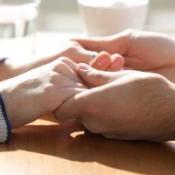 Did you know one of the main predictors for having a substance use disorder is experiencing trauma?
Did you know one of the main predictors for having a substance use disorder is experiencing trauma?
A quick internet search yields many definitions of trauma. I think the simplest definition is this: an emotional response to a terrible event.
Note I did not specify what type of event or what type of response. These are all individualized. What might be traumatic for me could have little or no impact on you. A person experiencing trauma is in the best position to define their experience based on what they are thinking, feeling, and going through.
In one survey of adolescents receiving treatment for substance use, more than 70% had a history of trauma exposure. Teens who experienced physical or sexual abuse were three times as likely to use substances than those who had not. And 59% of young people with posttraumatic stress (PTSD) develop substance use disorders.
Another study found 60% to 80% of Vietnam veterans seeking PTSD treatment have alcohol use issues. They tend to binge drink in response to memories of trauma. Of further concern, veterans over the age of 65 who have PTSD are at a higher risk of attempting suicide if they also have an alcohol use disorder and/or depression.
People who experience trauma and PTSD often turn to alcohol and other substances to manage the intense flood of emotions and traumatic reminders. They may also use it to try to numb themselves. Drugs and alcohol may initially dull the effects of trauma and help manage associated distress, but a dangerous cycle may begin.
After a traumatic event, a person may drink to deal with anxiety, depression, and irritability. Typically, alcohol initially seems to relieve these symptoms. When we experience a traumatic event, the brain releases endorphins that help numb the physical and emotional pain of the event. This is our body naturally helping us cope.
However, this interrupts the natural protective function the body was already doing. As a result, we create a type of emotional withdrawal that can set us up to deal with increased and prolonged distress that could lead to the development of posttraumatic stress.
Drinking may have been the “solution” you turned to, but it is likely making things worse. We will not take that coping skill away until we teach you new ones.
Drinking often can contribute to PTSD symptoms and increase irritability, depression, and feeling off guard. Some drink to deal with insomnia that results from anxiety, anticipating nightmares, and circular thinking. Drinking actually impairs the quality of your sleep, however, setting up a destructive cycle. Trying to avoid memories of trauma can make them emerge in your sleep. Drinking also can make therapy less effective because you are not allowing yourself to effectively deal with trauma in a safe, healthy setting with a trained professional.
People who use substances may be less able to cope with a traumatic event. They may have increased difficulty with emotional and behavioral regulation. When chemical use starts, development gets significantly impaired. As a result, the person may be more likely to engage in risky behaviors that can lead to additional trauma.
The combination of trauma and drinking can increase challenges related to getting close to people and having conflicts with the people you do have a relationship with. Heavy drinking often leads to a confused and disorderly life. The very thing a person needs is support and connection, yet those are often damaged as a result of drinking consequences and behaviors.
A good therapist knows drinking is generally not THE problem. It is usually a symptom of another problem. Often, the problem is trauma. In such cases, drinking is not generally about having fun. It is about managing the pain of what you are dealing with.
Effective treatment of trauma does not mean you have to talk about what happened. We don’t want you to reexperience it. That probably happens enough. We focus more on how it is affecting you today. Drinking may have been the “solution” you turned to, but it is likely making things worse. We will not take that coping skill away until we teach you new ones. There are many other, more effective ways to deal with the past than drinking.
References:
- Bombardier, C.H., & Turner, A. (2009). Alcohol and Traumatic Disability. In R. Frank & T. Elliott (Eds.), The Handbook of Rehabilitation Psychology, Second Edition (pp. 241–258). Washington, DC: American Psychological Association Press.
- Khooury, L., Tang, Y. L., Bradley, B., Cubells, J. F., & Ressler, K. J. (2010). Substance Use, Childhood Traumatic Experience, and Post Traumatic Stress Disorder in an Urban Civilian Population. Depression and Anxiety. 27(12): 1077–1086.
- National Child Traumatic Stress Network. (2008). Understanding Links Between Adolescent Trauma and Substance Abuse: A Toolkit for Providers, Second Edition. United States of America.
- Trauma and Violence. (2015). Retrieved from https://www.samhsa.gov/trauma-violence
- Volpicelli, J., Balaraman, G., Hahn, J., Wallace, H., & Bux, D. (1999). The Role of Uncontrollable Trauma in the Development of PTSD and Alcohol Addiction. Alcohol Research and Health, 23(4), 256-262.

The preceding article was solely written by the author named above. Any views and opinions expressed are not necessarily shared by GoodTherapy.org. Questions or concerns about the preceding article can be directed to the author or posted as a comment below.

 'I’m Still Not Good Enough': When Trauma's Old Ghosts Resurface
'I’m Still Not Good Enough': When Trauma's Old Ghosts Resurface ‘Why Do I Do That?’ The Silent Sway of the Threat Response
‘Why Do I Do That?’ The Silent Sway of the Threat Response The Importance of Relational Support in Healing from Trauma
The Importance of Relational Support in Healing from Trauma

Please fill out all required fields to submit your message.
Invalid Email Address.
Please confirm that you are human.
Leave a Comment
By commenting you acknowledge acceptance of GoodTherapy.org's Terms and Conditions of Use.